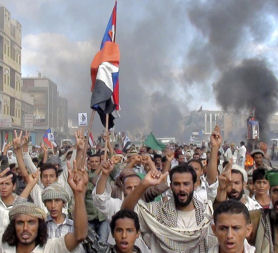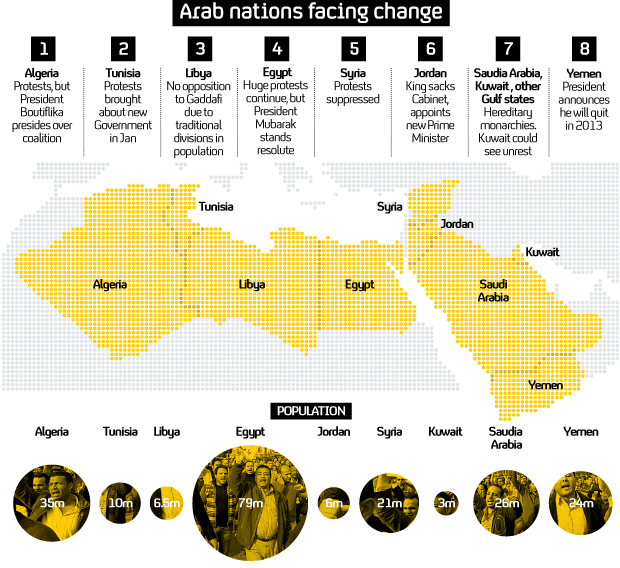Middle East unrest: Egypt and Tunisia to Jordan and Yemen
The roots of the current uprising lie in the Tunisian town of Sidi Bouzid. Channel 4 News looks at how the political revolt there has roared across the Middle East to Egypt, Sudan, Yemen and Jordan.
Tunisia
Mohammed Bouazizi could not dared to have imagine the revolt his desperate actions would spark.
The young vegetable seller burnt himself to death after his cart was confiscated by the council in the town of Sidi Bouzid.
The spot where he doused himself in petrol is still marked – local people call it the place of martyrdom.
His actions sent thousands of people onto the streets of Tunisia’s towns and cities.
Their demonstrations would eventually unseat the Tunisian Government and send President Zine al-Abidine Ben Ali fleeing the country.
Their demonstrations would also trigger a wave of similar protests across neighbouring countries.
Read more - Sidi Bouzid: roots of the Tunisia revolution
Egypt
Egypt’s largest cities have turned into centres of mass demonstrations.
Hundreds of thousands of people across the country have spent nine days on the streets demanding an end to President Hosni Mubarak’s 30 year rule.
Mr Mubarak announced on Tuesday evening that he would not stand for re-election in September; but the protests continue.
The situation is being monitored by governments around the world.
President Obama said: “To the people of Egypt, particularly the young people of Egypt, I want to be clear: We hear your voices. I have an unyielding belief that you will determine your own destiny and seize the promise of a better future for your children and your grandchildren.”

Yemen
President Ali Abdullah Saleh of Yemen has announced that he will not attempt to extend his presidency when his current term expires in 2013.
It will bring to an end three decades of power.
“I present these concessions in the interests of the country. The interests of the country come before our personal interests,” Saleh told his parliament, Shoura Council and members of the military.
“No extension, no inheritance, no resetting the clock,” he said, making reference to ruling party proposals on term limits that had been seen as designed to enable him to run again.”
Saleh’s remarks came a day before a planned large opposition rally, dubbed a “Day of Rage”, seen as a barometer of the size and strength of the Yemeni people’s will to follow Egyptians and Tunisians in demanding a change of government.
Jordan
Facing widespread protests King Abdullah sacked his government on Tuesday.
He is seeking to appease Jordan’s powerful tribes by naming a conservative former army general as prime minister but he will need to appeal to a wider base to maintain stability and deflect regional turmoil.
The stability of Jordan is vital for Israel, which has a peace treaty and close security cooperation with its eastern neighbour.
British-educated King Abdullah is a key political and military partner of the West.

Sudan
The Sudanese are debating whether their nation could be home of the next mass uprising as students begin protests.
Human rights groups in the UK have called for the government to end its crackdown on freedom of expression.
According to Amnesty International, one student Mohammed Abdelrahman, is reported to have died after taking part in the demonstration.
Scores were injured and more than 70 were arrested after armed riot police and security services used batons and teargas to break up Sunday’s protests in Khartoum and Omdurman.
On Monday evening, more than 25 protestors were released. The number of those who remain in detention is still unknown. Students rallied inside their universities and there were reports of clashes between the demonstrators and the police as well as supporters of the National Congress Party, Sudan’s ruling party.
Dozens of demonstrators were taken to hospitals in Khartoum, some with severe injuries. Some protesters are still missing.
-
Latest news




